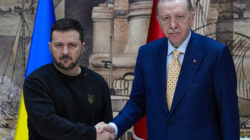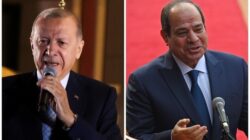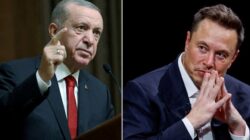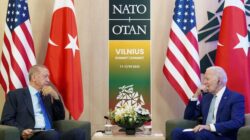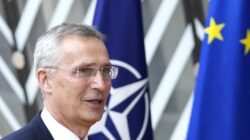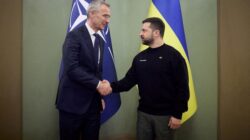ISTANBUL – Turkish President Recep Tayyip Erdogan was re-elected on Sunday, extending his increasingly authoritarian reign into a third decade as the country struggles with high inflation and the fallout from an earthquake that devastated entire cities.
A third term strengthens Erdogan’s hand both locally and internationally, and the election results will have far-reaching consequences well beyond Ankara. Turkiye is located at the crossroads of Europe and Asia, and it is an important member of NATO.
Unofficial results from competing news agencies showed Erdogan with 52 percent of the vote, compared to 48 percent for his competitor, Kemal Kilicdaroglu, with more over 99 percent of ballot boxes opened. The president of Turkiye’s election board affirmed Erdogan’s victory, adding that even after accounting for uncounted votes, the outcome was another term for Erdogan.
Erdogan thanked the people for entrusting him with the president for another five years in his first remarks since the polls ended.
“We hope to be worthy of your trust, as we have been for the past 21 years,” he said aboard a campaign bus outside his Istanbul house.
He mocked his opponent for his defeat, saying, “bye bye bye, Kemal,” as supporters booed.
“The only winner today is Turkiye,” Erdogan added, promising to work hard to bring Turkiye into the twenty-first century. This year marks the country’s centenary. “No one can look down on our nation.”
Kilicdaroglu campaigned on promises to reverse Erdogan’s democratic retreat, to recover the economy through more traditional policies, and to strengthen ties with the West. He called the election “the most unjust ever,” claiming that all state resources were devoted to Erdogan.
“We will continue to be at the forefront of this struggle until real democracy comes to our country,” he stated in Ankara. He expressed gratitude to the more than 25 million people who voted for him and urged them to “remain upright.”
People have demonstrated their willingness “to change an authoritarian government despite all pressures,” he remarked.
Even before the final results were announced, Erdogan supporters were waving Turkish or governing party flags, blasting automobile horns, and chanting his name. In some Istanbul areas, celebratory gunfire was heard.
Erdogan’s administration denied Sweden’s NATO membership application and purchased Russian missile-defense systems, prompting the US to kick Turkiye out of a US-led fighter-jet project. However, Turkiye was instrumental in negotiating a vital agreement that permitted Ukrainian grain supplies and prevented a global food crisis.
According to Steven A. Cook, a senior scholar at the Council on Foreign Relations in Washington, Turkiye is expected to “move the goalpost” on Sweden’s NATO membership as it seeks demands from the US.
He also predicted that Erdogan, who has spoken about proposing a new constitution, would make an even stronger push for it.
“It would be a less democratic constitution,” Cook argued, attempting to cement the reforms backed by Erdogan’s conservative and religious Justice and Development Party, or AKP.
Erdogan, who has led Turkiye for the past 20 years, narrowly lost the first round of elections on May 14. It was his first time losing an election outright, but he made amends on Sunday.
Despite crushing inflation and the impact of a terrible earthquake three months ago, his performance was outstanding.
Hungary’s Prime Minister Viktor Orban and Russian President Vladimir Putin, as well as leaders from Qatar, Venezuela, Azerbaijan, Pakistan, Libya, Algeria, Serbia, and Uzbekistan, thanked Erdogan.
The two contenders gave starkly different perspectives on the country’s future and recent history.
Critics criticize Erdogan’s unusual economic policies for driving up inflation and fueling a cost-of-living problem. Many also chastised his government for its sluggish response to the Turkiye earthquake, which killed over 50,000 people.
Erdogan has maintained the support of conservative voters who support him for elevating the profile of Islam in Turkiye, which was founded on secular ideals, and for increasing the country’s role in global affairs.
Hacer Yalcin, an Erdogan supporter in Ankara, believes Turkiye has a bright future. “Of sure, Erdogan will win… Who else is there? “He made everything for us,” Yalcin explained. “God blesses us!”
Erdogan, a 69-year-old Muslim, is expected to rule until 2028.
Through a narrowly won 2017 referendum that abolished Turkiye’s parliamentary style of governance, he converted the presidency from a primarily ceremonial role to a strong one. He was the first directly elected president in 2014, and he won the executive office in 2018.
The first part of Erdogan’s presidency saw the country embark on accession talks with the European Union, as well as economic progress that pulled millions out of poverty. But, after a failed coup attempt engineered by the US-based Islamic cleric Fethullah Gulen, he attempted to limit freedoms and the media and concentrated more power in his own hands.
The cleric claims he is not involved.
Erdogan’s opponent was a kind former civil servant who had led the pro-secular Republican People’s Party, or CHP, since 2010.
In a desperate bid to win over nationalist voters in the runoff, Kilicdaroglu promised to return refugees and ruled out peace talks with Kurdish rebels if elected.
Ahmet Koyun, a 37-year-old metalworker in Kurdish-majority Diyarbakir, said everyone would have to accept the results.
“It is unfortunate on behalf of our people that a government with such corruption, such stains, has returned to power.” “Mr. Kemal would have been fantastic for our country, at the very least for a change of scenery,” he remarked.
Following a legislative election on May 14, Erdogan’s AKP party and its allies retained a majority of seats in parliament.
Sunday also marked the tenth anniversary of the start of major anti-government protests in Istanbul’s Gezi Park, which became one of the most severe challenges to Erdogan’s government.
Erdogan’s reaction to the protests, which resulted in the conviction of eight people, foreshadowed a crackdown on civil society and freedom of expression.
Following the May 14 election, international observers cited the prosecution of false information dissemination and online restrictions as evidence that Erdogan had a “unjustified advantage.” They also stated that the high attendance demonstrated the endurance of Turkish democracy.
Erdogan and pro-government media depicted Kilicdaroglu, who earned support from the country’s pro-Kurdish party, as conspiring with “terrorists” and advocating for “deviant” LGBTQ rights.
Source: AFP



